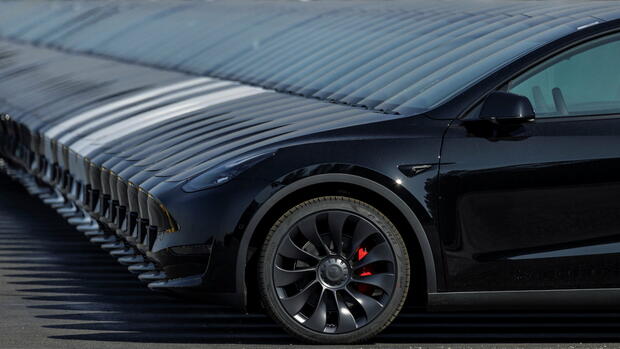The electric SUVs are also manufactured in Brandenburg – and are again offered at a lower price.
(Photo: Reuters)
Dusseldorf Tesla is now also lowering the prices for company cars in Germany. The US electric car manufacturer is now paying an “innovation premium” of 2250 euros for the 3 and Y models.
The money is paid in addition to the federal government’s environmental bonus and the manufacturer’s share. According to Tesla, this results in a total price reduction of up to 9,750 euros for a Model 3 and 9,000 euros for a Model Y. However, the offer is only valid until August; the environmental bonus for company cars will expire on September 1, 2023.
According to Tesla, fleet customers can now have a Model 3 from €33,035 and a Model Y for €35,473.
Tesla is turning into a normal mass manufacturer
Tesla has been repeatedly lowering prices for several months. The company is thus reacting to various factors, such as changed subsidies in certain countries and for certain sub-areas.
In Germany, for example, the state has been subsidizing electric cars less since the beginning of the year. For vehicles with a purchase price of up to 40,000 euros, the so-called environmental bonus falls from 6,000 to 4,500 euros, with a purchase price of up to 65,000 euros from 5,000 to 3,000 euros. The manufacturer subsidy falls accordingly by half, to 2250 or 1500 euros per vehicle.
Another factor is production. The new car plants in Grünheide and Austin as well as the greatly expanded plant in Shanghai are increasing their numbers. Tesla currently produces around 5,000 vehicles a week in its German plant, significantly more than when production started more than a year ago. The target is even higher at 10,000 vehicles.
Tesla production: 78,000 vehicles in overcapacity
The new situation is reflected in Tesla’s sales statistics, namely in the difference between manufactured and delivered vehicles. In the past it was always relatively small. But in the past three quarters, the number has shot up – to a total of more than 78,000 vehicles.
The development is normal to a certain extent. With higher production, there are fluctuations in sales and distribution, but according to car expert Ferdinand Dudenhöffer, this only partly explains the overcapacity.
The truth is probably also: As a mass manufacturer, Tesla can no longer count on its committed fan community, and competition from new models from German, American and Chinese manufacturers is also increasing.
More: Tesla massively lowers prices in Germany
